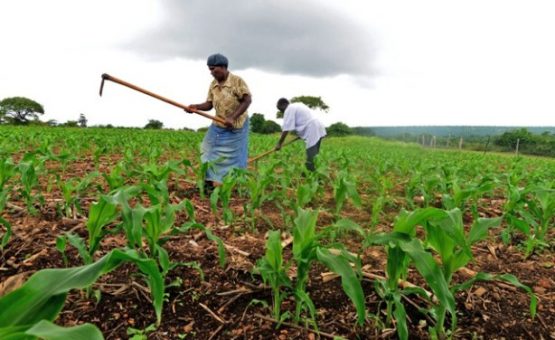A bold mission to reclaim Nigeria’s agricultural glory

Once the bedrock of Nigeria’s economy, agriculture was sidelined for decades in the wake of the oil boom. Now, at the midpoint of President Bola Tinubu’s administration, the sector is staging a bold comeback. Faced with soaring food prices, insecurity and climate threats, Tinubu has launched sweeping reforms aimed at transforming agriculture into a modern, productive and resilient engine of growth—capable of feeding the nation and driving true economic diversification, reports JULIANA AGBO
For decades, agriculture has stood as both a symbol of Nigeria’s rich potential and its persistent struggles. Once the cornerstone of the nation’s economy, the sector gradually faded into the background following the oil boom of the 1970s. Today, under President Bola Tinubu’s administration, agriculture is again being summoned to the frontlines—not as a relic of the past, but as a strategic engine for national revival.
As the administration crosses its halfway mark, President Tinubu has unveiled a sweeping vision to rejuvenate this crucial sector. His goal is not merely to return agriculture to a place of prominence but to redefine it as a modern, commercially viable enterprise capable of feeding a burgeoning population, creating millions of jobs, and diversifying the economy away from oil dependency. The administration’s intentions became immediately clear when, just weeks into office, President Tinubu declared a national emergency on food security in July 2023. The announcement came against a backdrop of skyrocketing food prices, worsened by the removal of fuel subsidies and ongoing insecurity in rural communities.
Recognising the urgency, the government swiftly released fertilisers and grains from national strategic reserves, providing immediate relief to farmers and vulnerable households. In tandem, Tinubu ordered a harmonisation of efforts between the Ministry of Agriculture and the Ministry of Water Resources to enable all-season farming through expanded irrigation. To stabilise food prices and strengthen food reserves, the government proposed the establishment of a National Commodity Board. This board is expected to act as a buffer against price shocks by purchasing and stockpiling essential food items during periods of surplus. These early interventions reflected more than just a crisis response—they signalled a strategic shift. The government began mobilising a coalition of stakeholders—seed companies, farmers’ associations, microfinance institutions, and agro-processors—toward a unified national food security mission.
At the heart of Tinubu’s agricultural push are a suite of bold initiatives designed to increase productivity, encourage innovation, and make farming a sustainable enterprise. The Agro-Pocket Initiative, under the National Agricultural Growth Scheme, is one of the flagship programmes. Its target: to cultivate 750,000 hectares of land across the country for staple crops such as rice, maize, wheat, and cassava. This initiative aims to boost cropping intensity and expand food output by offering targeted support—including input vouchers—to farmers.
In a move to cushion the harsh effects of inflation on consumers, the administration announced a 150-day suspension of duties and tariffs on the importation of essential food items, including rice, maize, and wheat. The government also facilitated the import of 250,000 metric tonnes each of maize and wheat, primarily for use by small-scale processors and millers. Meanwhile, recognising the pivotal role of knowledge transfer, the government unveiled a new National Agricultural Extension Policy. The reform reimagines extension services to be demand-driven, ICT-enabled, and market-oriented—marking a shift from outdated methods to modern, tech-savvy outreach capable of reaching farmers across all regions.
Perhaps one of the most far-reaching structural interventions has been the creation of the Ministry of Livestock Development, a first in Nigeria’s history. This landmark move aims to modernise animal husbandry, promote dairy and meat production, and address the longstanding conflict between herders and farmers—conflicts that have left many communities devastated and farmlands abandoned.
Challenges along the path
Despite the wave of reforms and fresh momentum, Nigeria’s agricultural transformation faces a number of entrenched obstacles that threaten to stall progress. Rising input costs, exacerbated by the subsidy removal, remain a major burden. The cost of fertiliser, agrochemicals, and transport has surged, leaving many smallholder farmers and poultry operators either scaling back or ceasing operations altogether. The affordability crisis is particularly acute in rural areas where access to finance is limited.
Insecurity continues to be one of the gravest threats. Banditry, insurgency, and farmer-herder clashes have rendered vast swathes of land uncultivable. In several states, entire communities have fled, leaving behind fallow fields and an increasingly fragile food production system. Beyond these, poor infrastructure remains a persistent bottleneck. Rural roads are dilapidated, storage facilities are scarce, and cold chain logistics are virtually non-existent in many parts of the country. The result? Post-harvest losses estimated at up to 40%, slashing farmer incomes and reducing national food supply.
The climate crisis adds another layer of complexity. In 2024, torrential floods displaced thousands and submerged countless hectares of farmland. These increasingly frequent weather extremes—droughts, delayed rains, pest invasions—underscore the need for a climate-resilient agricultural strategy. Compounding these woes is chronic underfunding. Despite agriculture’s critical role, the sector received just 1.3% of the proposed 2025 national budget—far below the 10% benchmark pledged under the Comprehensive Africa Agriculture Development Programme (CAADP). This funding shortfall hinders everything from research and mechanisation to farmer support and value-chain development.
What experts are saying
Speaking with The Nation, agricultural economist Dr Tijjani Abdulkadir commended the administration’s efforts but emphasised that sustained investment and inclusive policymaking are key to lasting success. “President Tinubu has shown commendable intent with his early policy actions,” he said. “However, intent must translate into impact. What we need now is a multi-year, well-financed agricultural roadmap that prioritises smallholder farmers, value chain development, and climate-smart practices.” He added that agricultural development should be central to Nigeria’s economic diversification agenda, noting that the sector holds immense potential to create jobs, boost exports, and lift millions out of poverty.
In a similar manner, Malam Isa Yakubu, a veteran agriculturist, urged the government to scale up its commitment by aligning national spending with CAADP goals. “Raising agricultural allocation to at least 10% of the national budget would be a game-changer,” he noted. “We could then invest meaningfully in rural roads, irrigation, research, and extension.”
Beyond policies and plans, voices from the grassroots paint a vivid picture of daily challenges and aspirations. Agnes Utah, a farmer based in Kwali Area Council in the Federal Capital Territory, underscored the need for tailored security strategies. “Community policing, local intelligence, and collaboration with traditional rulers can help secure our farms,” she said. “Right now, many of us live in fear. We need protection to keep growing food.” Utah also called for enhanced rural infrastructure to reduce post-harvest losses and improve market access. “With better storage and transport, we can earn more and waste less,” she added. “And with climate change getting worse, we need drought-resistant seeds, modern irrigation, and early warning systems to survive.”
Agriculture, long romanticised as the heartbeat of Nigeria, is finally being given the attention it deserves. President Tinubu’s agricultural agenda is ambitious, layered, and responsive to both immediate crises and long-term imperatives. It blends emergency response with structural reform, public support with private sector involvement. But agriculture is not transformed by pronouncements alone. It demands sustained commitment, cross-sectoral coordination, and, above all, the political will to make difficult choices.
At this halfway point of Tinubu’s tenure, the seeds of change have been sown. Whether they blossom into a bountiful harvest of prosperity depends on what comes next—how the administration consolidates gains, confronts remaining hurdles, and empowers the millions whose lives depend on the soil. As the nation watches, hope lingers on the horizon. Nigeria’s agricultural future remains unwritten—but perhaps, with the right tools and tillers, it may yet be golden.





